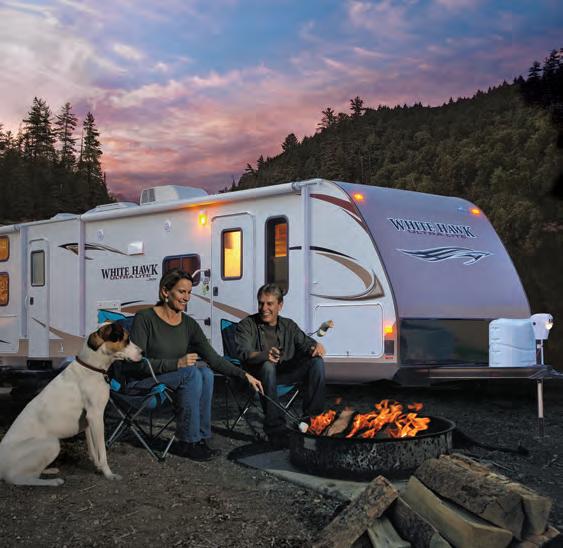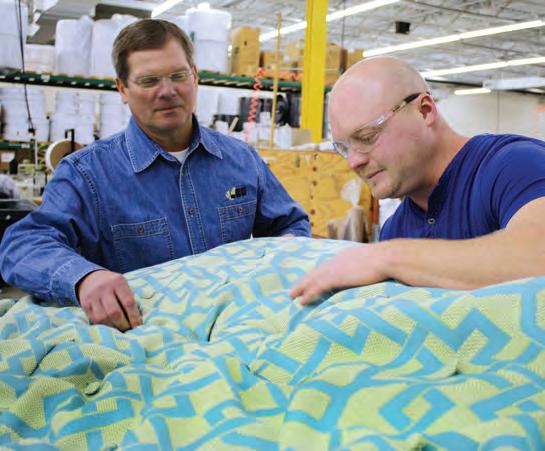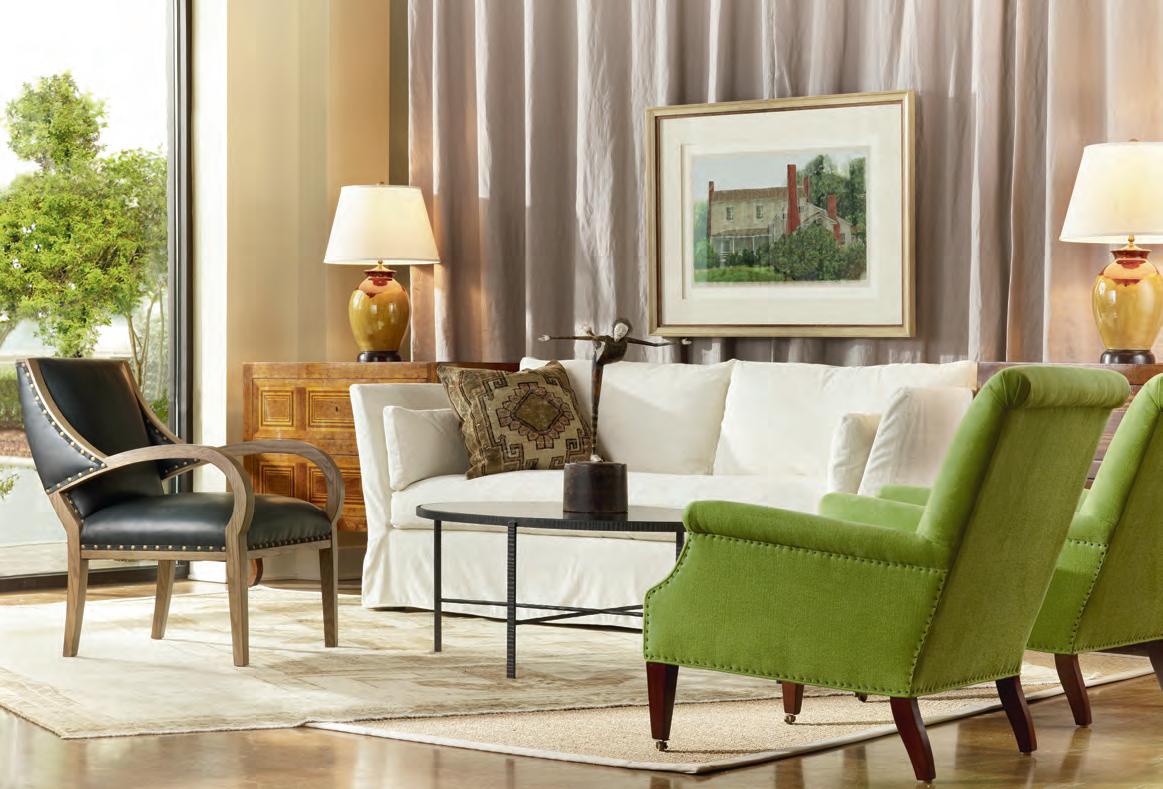
5 minute read
Jayco RV Strategy Helping Preserve
from Raven Issue No. 18
Great Outdoors
People who adopt the recreational vehicle (RV) lifestyle are typically driven by an enjoyment of the great outdoors, exploring sites that can range from Yellowstone to the Grand Canyon and from San Francisco Bay to the Florida Keys. So it only stands to reason that one of the country’s leading RV manufacturers is doing everything it can to help protect our national environment for generations to come.
Advertisement
“Our company began an aggressive recycling program more than 20 years ago as a way to reduce our impact on area landfills,” said Jeff Stauffer, continuous improvement manager with Middlebury, Ind.-based Jayco, the world’s largest privately held RV manufacturer. “About two years ago, we decided it was time to ramp up our recycling efforts into a full sustainability program, which gave birth to Jayco EcoAdvantage.”
EcoAdvantage is a collaborative sustainability initiative launched in 2011 by Jayco and its three operating divisions –Jayco, Starcraft RV and Entegra Coach. The program includes the active participation of employees and trade partners, such as Glen Raven and Trivantage, who are dedicated to helping build better RVs using fewer and renewable natural resources.
Jayco’s goals are ambitious: become 100 percent landfill free by 2015 by eliminating or recycling all manufacturing and office waste; significantly reduce fresh water use in product testing and other processes by increasing the use of reclaimed rainwater; conserve energy with a 40 percent reduction in utility use by 2014; and improve overall efficiency by streamlining administrative paperwork, production processes and construction methods.
Results thus far have been impressive. During 2011, the company conserved enough electricity to power 980 homes, saved more than 41,000 trees and conserved enough gas to make 21.4 trips around the earth in a car. Jayco also saved enough landfill space to accommodate a year’s worth of trash for more than 31,000 households.
Stauffer has worked for Jayco for more than 23 years in roles that have included engineering, production management and continuous process improvement. These experiences have given him an appreciation for how sustainable practices must be integrated seamlessly into the manufacture of RVs.
“Recycling has paid for most of the costs associated with our sustainability program through reduced landfill fees and income generated by the sale of recyclable materials,” Stauffer said. “We work closely with production to locate receptacles for recyclable materials conveniently to production areas. We’ve also invested in material handling and baling equipment that makes processing these materials as cost efficient as possible.”
In addition to collaboration within the company, Jayco has also enlisted the support of its supply chain partners in achieving sustainability goals.
“We’ve enlisted more than 20 different suppliers into our sustainability program, and we’ve learned a lot from each other and everyone has benefitted,” Stauffer said. “One of the most productive areas of collaboration has been in changes to packaging that reduce the amount of materials used when shipping component parts.”
EcoAdvantage also addresses the design of RV units, with a goal of reducing weight for improved fuel efficiency. At the same time, the company emphasizes increasing uses for green building products and green manufacturing processes, adopting innovative industry best practices wherever possible.
“We’ve received a lot of positive feedback from our dealers about the EcoAdvantage program,” Stauffer said. “Customers visiting dealer showrooms have heard about our sustainability program and are highly supportive of the effort. Everyone benefits when we build better RVs using fewer or renewable natural resources.”
Consumers Demanding More Sustainable Furniture
Consumers in the market for new furniture are motivated by many factors with color, design and comfort at the top of every list. Also added to this list by a growing number of consumers is sustainability reflected in both materials and manufacturing processes.
“In our view, 10 percent of the market is comprised of people who are dedicated to purchasing sustainable products regardless of the cost,” said Norman Coley, president of Lee Industries, a leading furniture manufacturer headquartered in Newton, N.C. “The majority of consumers, about 80 percent, care about the environment and sustainability, but are not necessarily willing to pay more, and you have to reach them with a compelling value proposition. For the remaining 10 percent, sustainability doesn’t register.”
Lee Industries is targeting that 90 percent of the marketplace that values sustainability with its commitment to “Earth-Friendly” furniture under its “naturalLee” brand, which encompasses products, processes and people. It’s an effort that began in the 1980s with the elimination of chlorofluorocarbon (CFC) gases from manufacturing processes and materials. Since then, Lee Industries has extended its sustainability focus into all aspects of the business, including soy-based cushions, recycled and organic fibers, and wood from forests following sustainable practices.

“We focused initially on our products by incorporating more sustainable materials, such as soy-based cushion materials; at first it was an upgrade to our existing lines, but today we extend these materials and practices to all of our offerings,”
Coley said. “We are also certified by both the Sustainable Forestry Initiative (SFI) and the Forest Stewardship Council (FSC), which support sustainable forestry practices.”
An environmental team at Lee Industries is responsible for driving the sustainability program by setting goals for positive environmental impacts and developing tactical plans for increased recycling and reducing the use of energy and water. Lee not only involves its employees with sustainability in the workplace, it also encourages them to be more responsible in environmental practices at home through its Personal Environmental Contributions (PEC) program.
“We’ve communicated to our people that everyone has an impact on our sustainability success,” Coley said. “Our program has also been extended to our supply chain partners and retail customers. It’s been very encouraging as everyone has gotten on board and we’re able to have a much larger impact with everyone working together.”
Founded as a family-owned business in 1969, Lee Industries’ sustainability program has included a broad range of activities, including replacement of CRT computer monitors with LCD devices, paperless communications, replacement of incandescent light fixtures with “green bulbs” and motion-activated lighting. Results have been substantial since 2008 including 1.3 million pounds of landfill waste eliminated. Electricity use has been reduced by a total of 1.1 million kilowatt hours, and more than 77,000 trees have been planted through Lee Industries’ contributions to the American Forests Association.
Lee Industries’ commitment to sustainable business practices is reflected in the company’s recent purchase and retrofitting of a 1960s-era building in neighboring Conover, N.C., as a new manufacturing center and corporate headquarters. Renovation has included a high-efficiency roof and HVAC system, motionsensitive lighting, low-flow water fixtures and energy-efficient windows.
The ultimate success of any sustainability program is the marketplace. With double-digit sales growth since 2009, Lee Industries, which features a line of Sunbrella® fabrics, is confident that all of its business strategies, including sustainability, are helping the company continue to move forward during challenging economic conditions.


“We have always prided ourselves as leaders in the industry,” Coley said. “We want to manufacture furniture that we would like to have in our own homes; we want to feel that we are having a positive impact in making the world a better place.”
“We want to manufacture furniture that we would like to have in our own homes; we want to feel that we are having a positive impact in making the world a better place.”









